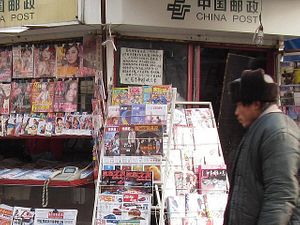As the Columbia Journalism Review noted, fake news goes global today. China, where media outlets are under strict state control, is not an exception. In terms of the Doklam standoff between China and India, some of China’s national media — the Global Times in particular — has been trying to distort information and even incite local Chinese anti-India sentiment.
Since Indian troops tried to stop the Chinese Army from building a road in the Doklam area and the two countries settled into a standoff about 50 days ago, many Chinese media outlets have published aggressive rhetoric (as have Indian media, by the way). Besides notorious tabloids and social media, some among the state-run presses often viewed as Chinese government mouthpieces have also published sensational and distorted reports about the standoff.
A piece of this fake news puzzle is the way Chinese national media cites Indian media. As The Diplomat reported earlier, China’s Defense Ministry invited a delegation of Indian media on August 7. In the meeting, the Indian journalists had a face-to-face dialogue with high-level officers of the People’s Liberation Army. However, the defense ministry didn’t make information about the visit public to China’s domestic media. So the meeting was only widely reported by Indian media. Nevertheless, China’s national media has closely focused on the Indian press’ reports on China, especially on Doklam.
Immediately after reports about the Defense Ministry meeting appeared in the Indian press, China’s national media selected some information in the Indian reports and translated it into Chinese. The People’s Daily mobile version published an article — “A slap in the face! Bhutan acknowledges that Doklam is a Chinese area and finds it strange that the Indian troops are on the Chinese soil”– based on the report– “Bhutan acknowledges that Doklam is a Chinese area: Chinese official”– of Press Trust of India(PTI). It is apparent that People’s Daily intentionally deleted the most important part of the headline –“Chinese official.” Even in the article itself, People’s Daily downplayed the fact that the Chinese official is the only source of the information and highlighted the Bhutan part. In the end, People’s Daily even claimed that “Bhutan acknowledges that Doklam is a Chinese area” was widely reported by Indian media. Soon, the article was reposted by the Global Times (the most hawkish Chinese state-run newspaper) and grabbed attention there. It’s noteworthy that the Global Times is actually under the People’s Daily, although the staff are different.
Other than the above article, the Global Times has published or reposted other distorted stories, too. For example, on August 5, the Global Times cited another PTI report and produced an article: “Indian Prime Minister Modi spoke about Doklam, attempting to muddle through by dialogue.” On the same day, the People’s Daily mobile version refuted the Global Times’ article, pointing out that Modi didn’t speak about Doklam.
What’s most worrisome is that the Global Times intentionally incited anti-Indian sentiment. On August 9, after an earthquake struck China’s southwest, the Global Times published an article, claiming that “some Indian netizens said God sent earthquake to publish China” by quoting several posts on Twitter.
It is obvious that the Global Times found these posts by searching keywords of “China, India, earthquake” and it is highly questionable if all the remarks were posted by Indian netizens. In addition, Twitter is blocked by China’s Great Firewall so most Chinese netizens are not able to log on and double-check the information.
No wonder even China’s Defense Ministry had to tell Indian journalists that some views reported by China’s hawkish government-run media (Global Times in particular) cannot represent the position of the Defense Ministry.

































